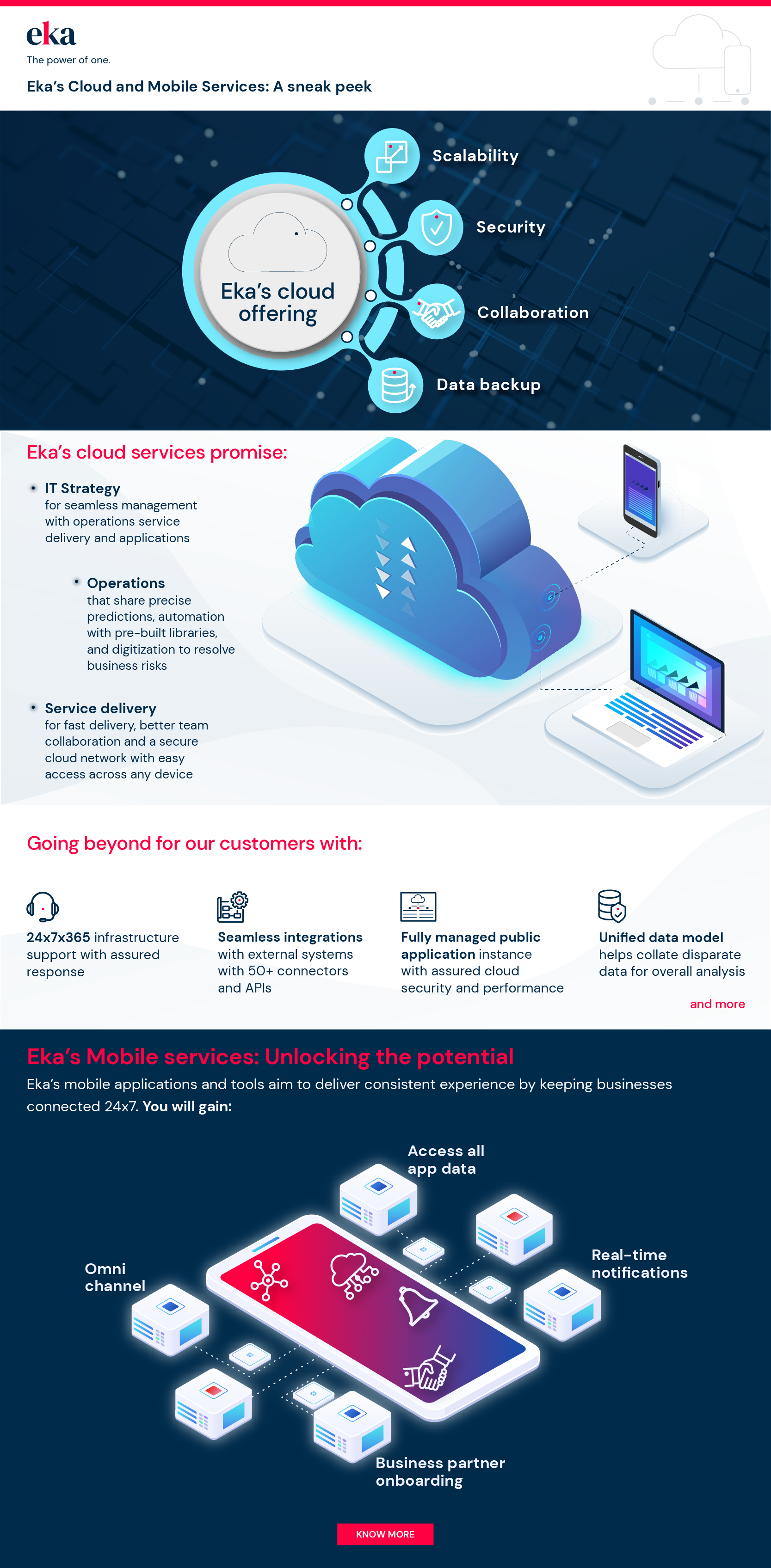Cloud and mobile services continue to grow rapidly. A McKinsey report states that the global SaaS market is currently worth $3 trillion and could surge to $10 trillion by 2023.

Unlocking efficiency: Utilize the power of cloud and mobile solutions
Cloud and mobile services continue to grow rapidly. A McKinsey report states that the global SaaS market is currently worth $3 trillion and could surge to $10 trillion by 2023.
This popularity of cloud and mobile services can be attributed to:
- Lower cost: Cloud solutions reside in a shared environment with complete control over the hosting environment. This leads to lower cost of hardware and software licensing.
- Reduced time: Since cloud solutions are pre-installed and configured in the platform, businesses save time with quicker installation.
Today the market is saturated with several options, but organizations, for instance, commodity trading businesses, must understand the fundamental benefits that both cloud services and mobile services offer to make the optimum choice.
What are the benefits of cloud services and mobile services?
Cloud and mobile services offer several benefits to businesses:
- Security: Data is key in today’s digital landscape. Cloud solutions provide data encryption, access control and compliance which enhances data security. This ensures critical data is not lost or wrongly analyzed. Cloud technology also brings security and disaster recovery at a better value while offering HTTPS protocols, field-level security and role-based hierarchy controls and much more.
- Scalability: As enterprises grow and evolve, so do their requirements. Cloud solutions help commodity trading companies to promptly onboard new users, customers, counterparties, and commodities. By leveraging cloud solutions, enterprises can reduce the time taken to include new credit limits and trading functions from months to hours. This prompts efficiency and reduces redundancy.
- Real-time insights: Cloud solutions offer their clients high uptime, disaster recovery, full-time support and data backup options. Enterprises can implement cloud solutions in less time and address several regulatory and stakeholder obligations effectively. Cloud-based technology provide real-time insights into key metrics such as counterparty exposures, risk reporting, derivative P&L reports, and value at risk (VaR). By leveraging cloud-based technology, commodity trading companies can access these insights rather than wait for the IT system to allow access.
- Flexibility: Cloud solutions offer flexibility with several features that are customised to meet the client’s specific needs. Using the power of real-time data and advanced analytics, enterprises gain the agility to thrive in volatile markets by responding to risks and opportunities in real-time. Cloud solutions also go live faster, enabling improved risk management.
What are the business challenges of adopting cloud and mobile services?
However, businesses face several challenges when adopting cloud and mobile services. These include data security, regulations, skill gap, resistance to adoption, migration strategy and more. Let us investigate these concerns individually.
1) Data security: Data security is the biggest concern when enterprises store their sensitive data with a third-party cloud provider. If data is lost, leaked, or exposed, it could cause severe disruption and damage to the business. Businesses must make a strategy to keep mission-critical data at their premises or ensure complete data security at rest and in transit while they migrate to a cloud environment.
Also read: Concerned about the security of your E/CTRM application? We have got something for you!
2) Data sovereignty regulations: A common concern with enterprises switching to cloud solution is data sovereignty regulations. In countries such as Qatar, there are legal concerns about allowing data to be moved to the cloud. Even with industry and government department-specific policies, there is no blanket rule forcing data to remain within a geographical location. While every industry and government department will have its specific requirements, these concerns must have a definitive structure so that businesses do not potentially lose out on the many benefits offered by cloud technologies.
3) Skills gaps: Technology is upgrading at a fast pace and it requires effort, both on the company’s and employee’s behalf, to meet these changing demands head-on. According to surveys, complexity remains a significant obstacle in the adoption of cloud services. A report by SoftwareOne states that 98% of global organizations are facing difficulty in finding people with general cloud skills and cloud architecture knowledge. The survey emphasizes that enterprises need to focus on expanding their employees’ skill to make them future-proof and ready.
4) Resistance to adoption: Resistance to change is inherent. Migration can be costly and time-consuming and unless the workforce clearly understands the need to make a transition, it can be a challenge that is difficult to bridge. For enterprises to ensure this transition, they need to take charge and state clear reasons behind the changes. Open communication will help bridge the gap and cement unity in accepting a new and improved solution.
5) Migration strategy: Whether to rebuild, lift and shift, re-host (IaaS), refactor (PaaS), replace (SaaS), or opt for a combination? There is always a challenging question during migration. This decision is specific to the nature of the organization’s applications, infrastructure, network, security, privacy, scalability, regulatory, and business requirements. A detailed analysis of all these factors, including the budget, risk, time, etc., will help arrive at the right distribution strategy.
What are the business solutions to adopt cloud and mobile services?
In the commodity trading space, we are witnessing a transformation in the tech landscape as organizations are switching from on-premises commodity trading and risk management solutions to cloud-based systems.
Research from Commodity Technology Advisory and Cloud Computing News has stated that cloud-delivered solutions now significantly outsell on-premises solutions for commodity traders. They are disrupting the industry and will significantly outpace expenditure spent on traditional deployments over the next few years.
It is crucial to understand that making a digital transition, while necessary, needs time and effort. As such, it is better to partner with SaaS-based companies with a proven record that not only ensures a smooth transition but provides support at every step.

Here are some strong reasons to help enterprises adopt cloud and mobile services:
High-tech security and protection: Organizations should choose a cloud partner that provides state-of-the-art data security and protection. Case in point, Eka’s cloud platform is built on the core principles of information security- AIC triad; which focuses on availability, integrity, and confidentiality. It is also compliant with SOC 2 Type I, SOC 2 Type II and GDPR/CCPA. Using a single sign-on via industry-standard authentication protocols and integrated with best-in-class DLP, EMM, and archival partners. This guarantees extensive modern capabilities that organizations can leverage for all their commodity management needs across multiple asset classes and industries.
You can check: Eka’s security
Detailed training: Upskilling is a crucial part of any transition and a company wishing to make this transition needs to focus on adapting their workforce to the new technology to avail its best benefits. In this regard, Eka provides an exhaustive and curated list of detailed videos on the Ekademy platform, several rounds of discussions and 24*7*365 support that allows the client’s team to get well-versed in the different intricacies of the platform and address any concerns.
Customized solutions: Different organizations, different needs. Enterprises need to understand their pain points and what they wish to enhance with a cloud solution. In this aspect, one size does not fit all. Hence it is important to choose a partner like Eka which provides a customized solution specific to a company’s need. With several built-in APIs and connectors, data migration is quick, and clients gain a single source of visibility of all their data along with automated workflow management while handling all the aspects of contract management.
Seamless connectivity: Consider two scenarios – a hybrid work culture where people may work from home and an organization which has offices in different geographical locations. In both these cases, the work must be done despite the physical distance. In other words, organizations should choose a cloud solution that provides seamless connectivity despite any challenges. Case in point, Eka’s mobile services offers instant notification on vital metrics with out-of-the-box available along with standard configuration, and seamless connectivity so that the work happens, without fail. Clients can also get dashboards and reports on their phones with access to all the application data which is secured and protected.
Also read: SaaS based Commodity Trading Platform in 2022
In conclusion, cloud technology has seen significant developments in 2023-2024, making it more efficient, secure, and cost-effective. We are witnessing the revolution that cloud services are offering to businesses to stay competitive and relevant. A McKinsey report mentions how cloud technology adoption will grow with a compound annual growth rate (CAGR) of 17% from 2023 to 2028. While businesses must overcome several challenges when adopting these services, it is vital to remember that the pros outweigh the cons.
To know more about the benefits of cloud services, check out our page.
Other resources

How can the metals and mining industry streamline direct material procurement?
Direct material procurement is complicated, especially for the metals and mining industry.

Large mining company implements Eka Control Systems and Eka QMS to improve throughput
The customer is an established Australian mining company that wanted to upgrade to the dynamic business requirements without drastic engineering changes.
